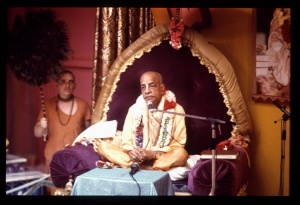SB 5.26.14: Difference between revisions
m (1 revision(s)) |
(Vanibot #0018 edit: make synonym terms in Sanskrit italic in SB - Vanisource) |
||
| Line 1: | Line 1: | ||
{{info | {{info | ||
|speaker= | |speaker=Śukadeva Gosvāmī | ||
|listener=King | |listener=King Parīkṣit | ||
}} | }} | ||
[[Category:Srimad-Bhagavatam - Canto 05 Chapter 26]] | |||
[[Category:Bhagavatam Verses Spoken by Sukadeva Gosvami - Vanisource|052614]] | |||
<div style="float:left">'''[[Srimad-Bhagavatam]] - [[SB 5|Fifth Canto]] - [[SB 5.26: A Description of the Hellish Planets|Chapter 26: A Description of the Hellish Planets]]'''</div> | |||
<div style="float:right">[[File:Go-previous.png|link=SB 5.26.13]] '''[[SB 5.26.13]] - [[SB 5.26.15]]''' [[File:Go-next.png|link=SB 5.26.15]]</div> | |||
{{RandomImage}} | |||
==== TEXT 14 ==== | ==== TEXT 14 ==== | ||
<div | <div class="verse"> | ||
yas tv iha brahma-dhruk sa kālasūtra-saṁjñake narake ayuta-yojana-parimaṇḍale tāmramaye tapta-khale upary-adhastād agny-arkābhyām ati-tapyamāne 'bhiniveśitaḥ kṣut-pipāsābhyāṁ ca dahyamānāntar-bahiḥ-śarīra āste śete ceṣṭate 'vatiṣṭhati paridhāvati ca yāvanti paśu-romāṇi tāvad varṣa-sahasrāṇi | :yas tv iha brahma-dhruk sa kālasūtra-saṁjñake narake | ||
:ayuta-yojana-parimaṇḍale tāmramaye tapta-khale | |||
:upary-adhastād agny-arkābhyām ati-tapyamāne 'bhiniveśitaḥ | |||
:kṣut-pipāsābhyāṁ ca dahyamānāntar-bahiḥ-śarīra | |||
:āste śete ceṣṭate 'vatiṣṭhati paridhāvati ca | |||
:yāvanti paśu-romāṇi tāvad varṣa-sahasrāṇi | |||
</div> | </div> | ||
| Line 13: | Line 24: | ||
==== SYNONYMS ==== | ==== SYNONYMS ==== | ||
<div | <div class="synonyms"> | ||
''yaḥ''—anyone who; ''tu''—but; ''iha''—in this life; ''brahma-dhruk''—the killer of a brāhmaṇa; ''saḥ''—such a person; ''kālasūtra-saṁjñake''—named Kālasūtra; ''narake''—in the hell; ''ayuta-yojana-parimaṇḍale''—having a circumference of eighty thousand miles; ''tāmra-maye''—made of copper; ''tapta''—heated; ''khale''—in a level place; ''upari-adhastāt''—above and beneath; ''agni''—by fire; ''arkābhyām''—and by the sun; ''ati-tapyamāne''—which is being heated; ''abhiniveśitaḥ''—being made to enter; ''kṣut-pipāsābhyām''—by hunger and thirst; ''ca''—and; ''dahyamāna''—being burned; ''antaḥ''—internally; ''bahiḥ''—externally; ''śarīraḥ''—whose body; ''āste''—remains; ''śete''—sometimes lies; ''ceṣṭate''—sometimes moves his limbs; ''avatiṣṭhati''—sometimes stands; ''paridhāvati''—sometimes runs here and there; ''ca''—also; ''yāvanti''—as many; ''paśu-romāṇi''—hairs on the body of an animal; ''tāvat''—that long; ''varṣa-sahasrāṇi''—thousands of years. | |||
</div> | </div> | ||
| Line 20: | Line 31: | ||
==== TRANSLATION ==== | ==== TRANSLATION ==== | ||
<div | <div class="translation"> | ||
The killer of a brāhmaṇa is put into the hell known as Kālasūtra, which has a circumference of eighty thousand miles and which is made entirely of copper. Heated from below by fire and from above by the scorching sun, the copper surface of this planet is extremely hot. Thus the murderer of a brāhmaṇa suffers from being burned both internally and externally. Internally he is burning with hunger and thirst, and externally he is burning from the scorching heat of the sun and the fire beneath the copper surface. Therefore he sometimes lies down, sometimes sits, sometimes stands up and sometimes runs here and there. He must suffer in this way for as many thousands of years as there are hairs on the body of an animal. | The killer of a brāhmaṇa is put into the hell known as Kālasūtra, which has a circumference of eighty thousand miles and which is made entirely of copper. Heated from below by fire and from above by the scorching sun, the copper surface of this planet is extremely hot. Thus the murderer of a brāhmaṇa suffers from being burned both internally and externally. Internally he is burning with hunger and thirst, and externally he is burning from the scorching heat of the sun and the fire beneath the copper surface. Therefore he sometimes lies down, sometimes sits, sometimes stands up and sometimes runs here and there. He must suffer in this way for as many thousands of years as there are hairs on the body of an animal. | ||
</div> | </div> | ||
__NOTOC__ | |||
<div style="float:right; clear:both;">[[File:Go-previous.png|link=SB 5.26.13]] '''[[SB 5.26.13]] - [[SB 5.26.15]]''' [[File:Go-next.png|link=SB 5.26.15]]</div> | |||
__NOTOC__ | |||
__NOEDITSECTION__ | |||
Revision as of 02:05, 1 December 2017

A.C. Bhaktivedanta Swami Prabhupada
TEXT 14
- yas tv iha brahma-dhruk sa kālasūtra-saṁjñake narake
- ayuta-yojana-parimaṇḍale tāmramaye tapta-khale
- upary-adhastād agny-arkābhyām ati-tapyamāne 'bhiniveśitaḥ
- kṣut-pipāsābhyāṁ ca dahyamānāntar-bahiḥ-śarīra
- āste śete ceṣṭate 'vatiṣṭhati paridhāvati ca
- yāvanti paśu-romāṇi tāvad varṣa-sahasrāṇi
SYNONYMS
yaḥ—anyone who; tu—but; iha—in this life; brahma-dhruk—the killer of a brāhmaṇa; saḥ—such a person; kālasūtra-saṁjñake—named Kālasūtra; narake—in the hell; ayuta-yojana-parimaṇḍale—having a circumference of eighty thousand miles; tāmra-maye—made of copper; tapta—heated; khale—in a level place; upari-adhastāt—above and beneath; agni—by fire; arkābhyām—and by the sun; ati-tapyamāne—which is being heated; abhiniveśitaḥ—being made to enter; kṣut-pipāsābhyām—by hunger and thirst; ca—and; dahyamāna—being burned; antaḥ—internally; bahiḥ—externally; śarīraḥ—whose body; āste—remains; śete—sometimes lies; ceṣṭate—sometimes moves his limbs; avatiṣṭhati—sometimes stands; paridhāvati—sometimes runs here and there; ca—also; yāvanti—as many; paśu-romāṇi—hairs on the body of an animal; tāvat—that long; varṣa-sahasrāṇi—thousands of years.
TRANSLATION
The killer of a brāhmaṇa is put into the hell known as Kālasūtra, which has a circumference of eighty thousand miles and which is made entirely of copper. Heated from below by fire and from above by the scorching sun, the copper surface of this planet is extremely hot. Thus the murderer of a brāhmaṇa suffers from being burned both internally and externally. Internally he is burning with hunger and thirst, and externally he is burning from the scorching heat of the sun and the fire beneath the copper surface. Therefore he sometimes lies down, sometimes sits, sometimes stands up and sometimes runs here and there. He must suffer in this way for as many thousands of years as there are hairs on the body of an animal.